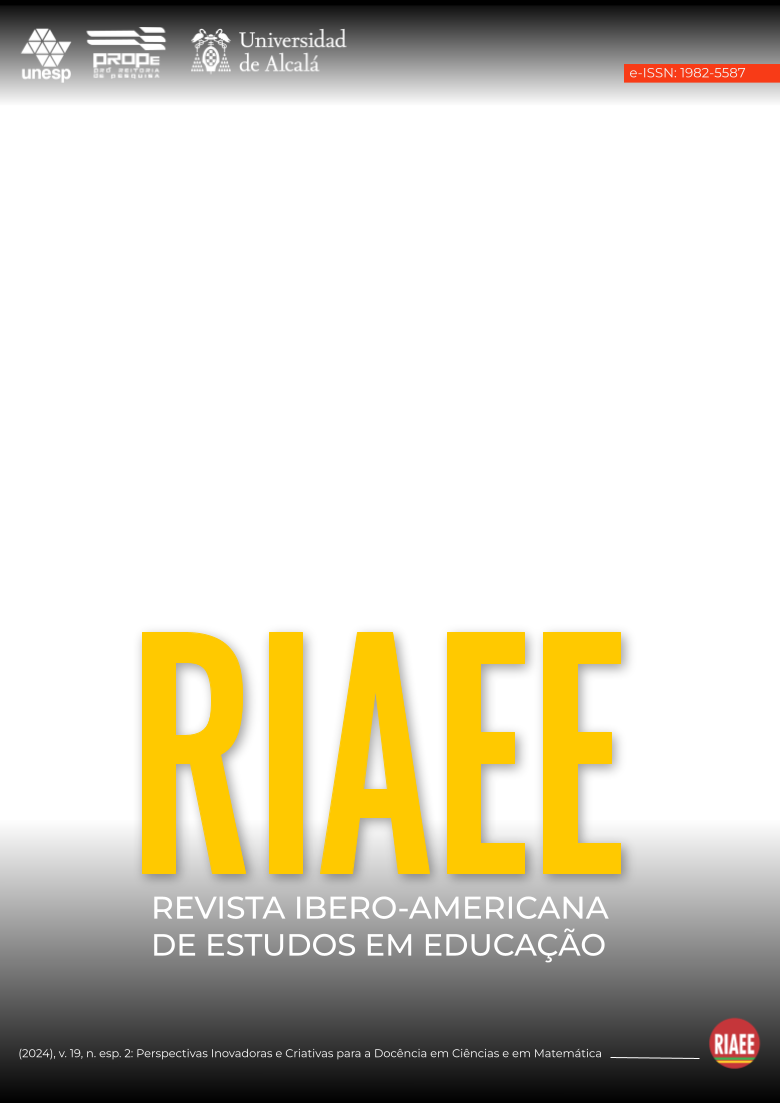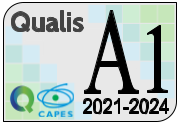DESAFIOS E OPORTUNIDADES PARA O USO DO CHAT GPT NA PESQUISA EM EDUCAÇÃO MATEMÁTICA
DOI:
https://doi.org/10.21723/riaee.v19iesp.2.18594Palavras-chave:
Chat GPT, Educação Matemática, Inteligência Artificial, Tecnologia da Informação e comunicaçãoResumo
O objetivo desse artigo é identificar os principais desafios e oportunidades associados ao uso do Chat GPT como ferramenta de apoio à pesquisa em Educação Matemática. Para tanto, realizamos uma entrevista com a Inteligência Artificial Chat GPT4. Os resultados indicam que o Chat GPT é uma ferramenta promissora baseada em inteligência artificial com potencial para auxiliar na pesquisa e ensino em educação matemática. Entretanto, seu uso responsável e ético requer consideração cuidadosa de seus desafios, limitações e oportunidades. A supervisão humana e a integração com outras metodologias de pesquisa são fundamentais para equilibrar o uso dessa tecnologia com abordagens pedagógicas. Por fim, promover a equidade e a inclusão são essenciais para garantir que todos os alunos tenham acesso à tecnologia e se beneficiem de seu potencial.
Downloads
Referências
ALEKS. Assessment and Learning in Knowledge Spaces. Disponível em: https://www.aleks.com/, 2023. Acesso em: 02 dez. 2022.
BAKRI, S. R. B. A.; LING, S.-E.; JULAIHI, N. H. B.; LIEW, C.-Y.; LING, S.-C. Improving low passing rate in mathematics course at higher learning education: Problem identification and strategies towards development of mobile app. In: International Conference on Computer and Drone Applications (IConDA), 2017. Proceedings […]. Kuching, Malaysia, 2017. p. 77-81. DOI: 10.1109/ICONDA.2017.8270403.
BAYERL, C. V.; DALBÓ, D. F.; CARDOSO, C. V. Investigações sobre o whatsapp nos processos de ensino e de aprendizagem: refletindo sobre o uso das tecnologias digitais durante a pandemia da COVID-19. Kiri-kerê: Pesquisa em Ensino, [S. l.], n. 12, 2022. DOI: 10.47456/krkr.v1i12.37087.
BELUSSO, R.; PERUCHIN, D. Modificações no processo de aprendizagem com a inserção de tecnologias digitais na educação. #Tear: Revista de Educação, Ciência e Tecnologia, Canoas, v. 7, n. 1, p. 1-17, 2018. DOI: 10.35819/tear.v7.n1.a2701.
BOGDAN, R. C.; BIKLEN, S. K. Investigação qualitativa em educação. Porto Codex. Portugal: Porto Editora, 1994.
BOJARSKI, M.; DEL TESTA, D.; DWORAKOWSKI, D.; FIRNER, B.; FLEPP, B.; GOYAL, P.; JACKEL, L. D.; MONFORT, M.; MULLER, U.; ZHANG, J.; ZHANG, X.; ZHAO, J.; ZIEBA, K. End to end learning for self-driving cars. 2016. Disponível em: https://arxiv.org/abs/1604.07316. Acesso em: 23 abr. 2023.
BORGES NETO, H.; BORGES, S. M. C. As tecnologias digitais no desenvolvimento do raciocínio lógico. Linhas Crí-ticas, [S. l.], v. 13, n. 24, p. 77–88, 2007. DOI: 10.26512/lc.v13i24.3344.
DREAMBox Learning. DreamBox Learning Math. 2023. Disponível em: https://www.dreambox.com/. Acesso em: 10 dez. 2023.
ELLINGTON, A. J. A Meta-Analysis of the Effects of Calculators on Students’ Achievement and Attitude Levels in Precollege Mathematics Classes. Journal for Research in Mathematics Education, [S. l.], v. 34, n. 5, p. 433–463, 2003. DOI: 10.2307/30034795.
GONÇALVES, T. V.; LEBREGO, R.; BARREIRA, J.; SIQUEIRA, I. Instrucciones de enseñanza expresadas por profesores de ciencias en cartas a sus alumnos. Campo Abierto. Revista De Educación, [S. l.], v. 39, n. 2, p. 207-219, 2020.
KNEWTON. Adaptive Learning Platform, 2023. Disponível em: https://www.knewton.com/. Acesso em: 23 abr. 2023.
KOEDINGER, K. R.; ANDERSON, J. R.; HADLEY, W. H.; MARK, M. A. Intelligent tutoring goes to school in the big city. International Journal of Artificial Intelligence in Education, [S. l.], v. 8, p. 30-43, 1997.
MA, J. Intelligent Decision System of Higher Educational Resource Data under Artificial Intelligence Technology. International Journal of Emerging Technologies in Learning (iJET), [S. l.], v. 16, n. 5, p. 130–146, 2021. DOI: 10.3991/ijet.v16i05.20305.
MOLL, I. The Myth of the Fourth Industrial Revolution: Implications for Teacher Education. In: MARINGE, F. (ed.). Higher Education in the Melting Pot: Emerging Discourses of the 4IR and Decolonisation. Cape Town: Aosis, 2021. p. 91–110.
MORAES, R.; GALIAZZI, M. C do. Análise Textual Discursiva. Ijuí, RS: Unijuí, 2007.
PARREIRA, A.; LEHMANN, L.; OLIVEIRA, M. O desafio das tecnologias de inteligência artificial na Educação: percepção e avaliação dos professores. Ensaio: Avaliação e Políticas Públicas em Educação, [S. l.], v. 29, n. 113, p. 975-999, 2021. DOI: 10.1590/S0104-40362020002803115.
PEREIRA, J. A Inteligência Artificial e o Processo Educacional: desafios e possibilidades na era do ChatGPT. Pelotas: Rubra Cinematográfica, 2023.
POWERS, J.; AZHAR, M. Preparing Teachers to Engage Students in Computational Thinking through an Introductory Robot Design Activity. Journal of Computers in Mathematics and Science Teaching, [S. l.], v. 39, n. 1, p. 49-70, 2020. Disponível em: https://www.learntechlib.org/p/213891. Acesso em: 10 abr. 2023.
SHUTE, V. J.; RAHIMI, S. Review of computer-based assessment for learning in elementary and secondary education. Journal of Computer Assisted Learning, [S. l.], v. 33, n. 1, 2017.
SOARES, F. R.; SANTANA, J. R.; SANTOS, M. J. C. dos. A realidade aumentada na aprendizagem de Geometria Espacial e as contribuições da Sequência Fedathi. Revista de ensino de ciências e matemática, [S. l.], v. 13, n. 4, 2022. DOI: 10.26843/rencima.v13n4a11.
VIDELA, R.; ROSSEL, S.; MUÑOZ, C.; AGUAYO, C. Online Mathematics Education during the COVID-19 Pandemic: Didactic Strategies, Educational Resources, and Educational Contexts. Educ. Sci., [S. l.], p.12, 2022. DOI: 10.3390/educsci12070492.
WEBBER, C.; CESARO, C.; GUDER, D.; FLORES, D.; BECKER, J. Experiências do pensamento computacional no ensino de ciências e matemática. Revista Brasileira De Ensino De Ciências E Matemática, v. 5, n. esp., p. 120-134, 2022. DOI: 10.5335/rbecm.v5iespecial.12853.
WOOLF, B. P. Building intelligent interactive tutors: Student-centered strategies for revolutionizing e-learning. [S. l.]: Morgan Kaufmann, 2009. DOI: 10.1016/B978-0-12-373594-2.X0001-9.
Downloads
Arquivos adicionais
Publicado
Como Citar
Edição
Seção
Licença
Copyright (c) 2024 Jonas Souza Barreira, Marcos Guilherme Moura-Silva, Tadeu Oliver Gonçalves

Este trabalho está licenciado sob uma licença Creative Commons Attribution 4.0 International License.
Manuscritos aceitos e publicados são de propriedade dos autores com gestão da Ibero-American Journal of Studies in Education. É proibida a submissão total ou parcial do manuscrito a qualquer outro periódico. A responsabilidade pelo conteúdo dos artigos é exclusiva dos autores. A tradução para outro idioma é proibida sem a permissão por escrito do Editor ouvido pelo Comitê Editorial Científico.








